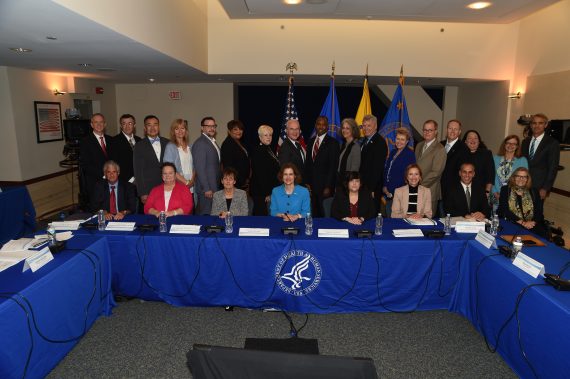
(9-4-17) Health and Human Services Secretary Thomas Price called serious mental illness a “silent epidemic” that touches nearly all Americans. Housing and Urban Development Secretary Ben Carson agreed. But where were their peers when the Interdepartmental Serious Mental Illness Coordinating Committee (ISMICC), created by Congress, held its first meeting last week?
The 21st Century Cures Act stated that these top federal officials would be members of the committee.
Attorney General Jeff Sessions.
Secretary of Veterans Affairs David J. Shulkin.
Secretary of Defense James Mattis.
Secretary of Education Betsy DeVos.
Secretary of Labor R. Alexander Acosta.
Commissioner of Social Security Nancy A. Berryhill.
I know I am nitpicking. All of these leaders work grueling hours and simply can’t be everywhere the public would like them to be. Plus, they sent senior officials from their agencies to represent them, many of them mental health experts.
But the Trump Administration missed a opportunity by not having its elite leadership team appear at the inaugural meeting, even if it were only long enough for a photo. (See photo at end of this blog showing those who did attend.) Each agency also should have issued a press release on the day of the meeting issued by its top executive addressing how their agency is working on improving mental health services and is reducing stigma within its own ranks.
Consider the powerful, positive message their appearances would have sent to the public and to the federal employees who work in their agencies.
Last week, I posted Secretary Price’s impressive opening statement and in this blog, I will share Dr. Elinore McCance-Katz’s important remarks to the committee.
But first a personal observation. When Secretary Price arrived at the meeting, he spoke to everyone in the room, asked their names, and shook their hands. Unfortunately, Secretary Ben Carson arrived at the last minute and left immediately after he spoke so he was unable to greet everyone.
When I worked at The Washington Post, I spent several weeks traveling with Archbishop Desmond Tutu. He made a point of introducing himself to every doorman, every food server, and the housekeeping staff when we traveled, at times, he did this before greeting dignitaries. I never forgot the visual statement it made: you are important regardless of whether you are the head of a great university or a janitor. You matter.
You might not agree with Secretary Price’s politics, but he showed tremendous class when he arrived at the meeting and took time to introduce himself and shake hands.
As for the others, they missed an important moment when they could have done tremendous good simply by showing up for a picture.
Remarks by Assistant Secretary Dr. Eleanor McCance-Katz
Thank you Secretary Price.
- In my role as Assistant Secretary for Mental Health and Substance Use, I am pleased to pledge the support of SAMHSA to the Secretary’s priority issue related to Serious Mental Illness. As many of you know, SAMHSA is the agency within HHS that is charged with leading the efforts to address behavioral health issues, such as SMI and SED in our country and I look forward to the work of this committee in helping SAMHSA to address this mission.
- As Assistant Secretary, I also look forward to working with my colleagues across the department. HHS touches all aspects of behavioral health –through programs such as Medicaid, Federally Qualified Health Centers, and block grants. I want to thank all of our public committee members for giving your time and your expertise to this undertaking. I feel sure that with your help we will make improvements to how we provide services to Americans living with serious mental illness.
- SAMHSA’s vision supports the charge of this committee; presently over 76% of SAMHSA’s mental health appropriation funds programs and services for those with serious mental illness and/or children with serious emotional disturbances. Programs range from our Mental Health Block Grant to a wide range of discretionary grants that support programs for the homeless, jail diversion, and supported employment.
- Looking forward, however, there is much more we can do and that SAMHSA should be doing. I want to mention a few areas of concern that I hope will be discussed today:
- A major concern that I have is keeping people with serious mental illness out of our jails and prisons –far too many people enter treatment as a result of criminal charges—which, to a great extent could be avoided had a person with serious mental illness received effective psychiatric medical care and other recovery supports.
- I believe that part of considering these issues includes a better understanding of how to facilitate entry into services. How do we move medical treatment of serious mental illness out of jails and prisons and back to communities and community mental health programs? A discussion of how to encourage development of therapeutic relationships that include shared decision making and advance directives where a person and their clinician work together to determine the care to be rendered should the person become incapacitated by mental illness would be very helpful. I also hope to hear discussion of how we can make better use of evidence based treatments such as assertive community treatment, assisted outpatient treatment, and linkages with peers to support recovery. Discussion of how civil commitment laws might be appropriately used to assist a person with preventing relapse to psychosis and whether there are ways the federal government can assist—for example by compensating physicians and other clinicians for time spent in such processes—such suggestions could help the federal government in thinking through whether there are ways to assist persons with serious mental illness that are not currently available.
- Access to care and recovery support services are an ongoing challenge. NSDUH estimates that 35% of Americans with serious mental illness get no treatment at all. This is a terrible disservice to those with great needs and we must address this. Further, too often people experiencing mental disorders spend long waiting periods in emergency departments which are not equipped to provide needed care and are not appropriate placements for those with serious mental illnesses. Hopefully, there will be some discussion of current needs in the United States for resources to address mental health needs: hospital beds—acute care vs. longer term needs, crisis intervention, and additional levels of care in communities—for example, group homes and recovery housing. Committee input regarding what we need to be doing to more effectively engage people in care is also needed.
- I hope committee members will provide input regarding issues surrounding the use of psychotropic medications particularly for those who experience psychosis. I hope to hear discussion around effectiveness of medication treatments, including expansion of the use of long-acting formulations which have been shown to be effective, the use of clozapine for treatment-resistant schizophrenia, as well as monitoring for and addressing side effects of psychotropic medications.
- A discussion of recovery supports and the evidence base for these–are there areas where federal agencies could better collaborate and what guidance would the committee offer?
- Issues related to how we can protect privacy rights while considering the concerns of family are ongoing and input from committee members would be helpful.
- We have major issues with workforce in terms of numbers of behavioral healthcare staff, geographic distribution, and preparation of providers to provide evidence-based interventions. Integration of behavioral and physical healthcare and the ability of behavioral health clinicians to address co-occurring mental and substance use disorders remain challenges. I hope there might be some discussion of such issues and mechanisms by which we can extend the reach of providers through innovative approaches as the current status results in too many not being able to access needed services.
- This committee can provide input that can help to guide us in government to more effective partnerships at the federal level so services and systems will be less disjointed for individuals, families, and providers at the local level.
- I know I’m asking for a lot, but I’m grateful to be here today as I begin my time with HHS, and to work with all of you in improving the behavioral health of the nation.
PS: I had hoped to also share two presentations with you that were made during the meeting. I found briefings by Dr. Lisa Dixon, professor of psychiatry at Columbia University Medical Center and director of the Division of Behavioral Health Services and Policy Research, and Dr. Joseph Parks, medical director of the National Council for Behavioral Health especially useful.
Official photo




